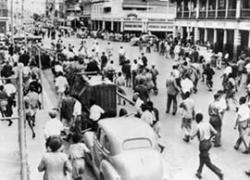
Published date
13 January 1949
References
Human Sciences Research Council (HSRC), Democracy and Governance, (2000), "Women marching into the 21st century: wathint' abafazi, wathint' imbokodo, pp.125-126.|Wallis, F, (2000). Nuusdagboek: feite en fratse oor 1000 jaar, Kaapstad: Human & Rousseau.
The attack on Indians by Zulus in January 1949 has generated a great deal of debate about the relationship between the two communities. Most observers believe that the Durban Riots of that year were not a result of racial bigotry between Indians and Zulus. However, the government seem to have been eager to advance this explanation as the reason for the attack, in the process reinforcing the commonly-held stereotypes about relationships between Zulus and Indians.
Indian businesses, families and communities were on the receiving end of the attacks. Africans or Zulus in particular, were responding to increasingly difficult economic circumstances and price hikes following the end of World War II. Indian Traders and landlords, being prominent in providing services for Africans ranging from renting out accommodation to selling basic necessities, were targeted. In the end, at least 137 people are killed and a thousand or more injured.